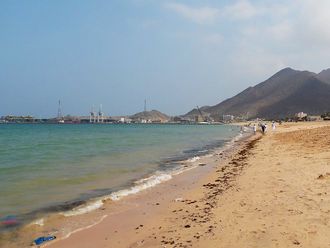Abu Dhabi: Thousands of students are gaining hands-on environmental lessons, as 27 schools in the capital conduct green audits as part of an initiative designed by the Environment Agency — Abu Dhabi (EAD).
At 11am yesterday, instead of attending lectures, a group of students were measuring pollutants at a mobile outdoor air quality monitoring unit.
Donning a green audit badge, Mohammad Salem Dakhil, a student at the Al Nahda School, carefully took down notes as experts showed them the process of monitoring outdoor air quality and explained its impacts on human health.
"This helps us learn by seeing and by doing rather than just learning theory," Dakhil, an active member of the schools' environment club, said.
Air quality
They measured air pollutants such as SO2, NOx, CO, ozone, lead and particulate matter at the unit set up by EAD at the Abu Dhabi Indian School, in collaboration with the Norwegian Institute for Air Research.
The air quality readings recorded by the students will be used to complete a green audit of their school for the Al Madaris Al Mustadama (sustainable schools) initiative, launched by EAD last September.
The initiative aims at encouraging schools to reduce their ecological footprint.
The green audit is one of its main components, in which students are required to measure their environmental impact within school premises in five main areas that include air, water, waste, land and energy, Gayathri Raghwa, of EAD, said.
Once the schools know where they stand, they can further adopt measures to reduce wastage of resources, she added.
"One can read a book or a topic on environment and nothing comes out [of it] more than a coffee table conversion. But this initiative makes children get down to the details," she said.
From the amount of water used and the amount that could be recycled, students even record the biodiversity on their campus.
By the end of this month, each of the schools will submit their audit reports to EAD, after which an inspection will be conducted to ensure data collection was carried out correctly, Raghwa said.
As the schools continue to battle it out for the sustainable school title, some, who have finished the data collection process are in shock over the figures they have found.
"We just found out from the water audit that 59,000 litres of water is used everyday just for maintaining the school's green area!
"It is shocking to see how much resources we are actually consuming. The children never realise all these things and now with the audit they are able to make the connections," said Ziad Yassin, the Environment Coordinator at Al Nahda School.
Schools initiative
Sustainable schools initiative has four main components:
Environment Club: The schools have to start an environment club in their schools and run it.
Green School Auditing: They have to assess their own environmental impact for land, water, waste, air and energy and find measures to reduce impacts.
Training of Trainers: Teachers are trained on how to incorporate environmental concepts in their individual subjects and integrate them into the curriculum.
Field Trips: Students are taken on field trips to the desert or a wetland to learn about the ecosystem and plants and animals.












